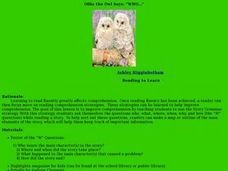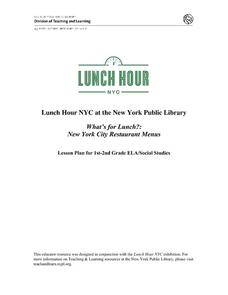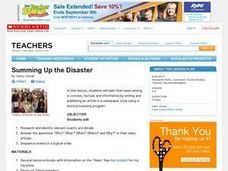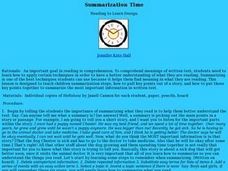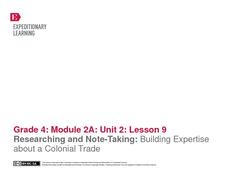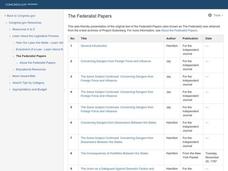Curated OER
Who, What, When, Where And Why is He There?
Students examine the process of asking the 5 W questions in order to increase their reading comprehension while reading non-fiction passages. They review silent reading techniques before listening to a teacher read aloud, and discussing...
Curated OER
Who, What, Where, When, Why?
In this creating information questions and answers worksheet, learners write who, what, where, when, and why questions write answers in complete sentences, and complete a dialogue. Students write 19 short sentences.
Curated OER
Grammar Exercise: Question Words
In this question word activity, 2nd graders choose the correct question word (what, when, where, who, whose, why, which, or how) to complete a question. There are ten questions to do.
Curated OER
What's So Important?
Students work to develop comprehension strategies. They focus on the five 'w' questions for summarizing: who, what, when, where, and why? Through modeling and guided practice, they apply these questions to summarize several passages in...
Tompson Solutions
Be a Reporter (The 5 W's and an H)
Teach your class how to investigate research sources. You can start out with this presentation, which lays out a easy strategy for asking questions and taking down answers that cover the important information.
Curated OER
Reading a Newspaper
Students define the terms associated with parts of a newspaper. They identify various sections of a newspaper and the type of articles found in each and provide the responses to who? what? when? where? and why? contained in a ...
Curated OER
Questions or Statements?
Students are introduced to the six question words of who, what, when, where, why and how. After being read a story, they are asked who and what the story was about. To end the lesson, they practice identifying questions and statements.
Curated OER
Ollie the Own Says: WHO
Scholars examine the strategy of making a story map or outline to identify the main elements of a story. They discuss the who, what, where, when, why, and how of a story, in an outline form. As a class they read a short story, answer the...
Curated OER
I Know Why the Caged Bird Sings by Maya Angelou: Fun Trivia Quiz
This Fun Trivia interactive, online quiz may be engaging for readers who want to self-assess their basic understanding of Angelou's I Know Why the Caged Bird Sings; however, I do not recommend it as a class assignment given the lack of...
Curated OER
Worksheet 1: Question Words
While this activity is short, it provides a quick review of forming sentences using who, what, where, when and why. This 6 question activity could be used in an elementary class or with ESL students.
New York Public Library
What's for Lunch?: New York City Restaurant Menus
Do you remember the days when a cup of coffee cost five cents? At A.W. Dennett restaurant in 1894, you could buy a five-cent cup of coffee and as well as a five-cent slice of pie to accompany it. The menu from that year is a primary...
Curated OER
Who is the Expert? Exploring Credible Sources in Healthcare
How do you decide what sources are credible when researching online? Evaluate sources with a focus on researching health issues. After brainstorming common health concerns and how they would try to diagnose these problems, class members...
Curated OER
Lesson 12: What Reasonable Conclusions are Possible?
Oftentimes, we jump to conclusions when we are given a limited amount of information. Take a look at reasonable conclusions with your communications studies class. If-clauses, dichotomous thinking, and assumptions are all covered with...
Student Handouts
The Five W's and How
Here is a great graphic organizer for ensuring that young researchers and writers cover all their bases when brainstorming a topic by considering the five W's (who, what, where, when, and why) and how.
Curated OER
Summing the Disaster
Students assume the role of a newspaper editor during the time of the Titanic disaster. They must search out the accurate answers to the questions: What? When? Where? Who? and Why? students then write their own newspaper article...
Curated OER
Patience
First graders listen to the story New Shoes for Silvia by Johanna Hurwitz. In this literacy instructional activity, 1st graders do a picture walk and answer who, what, when, where and why questions. Students answer multiple questions...
Curated OER
When Turtle Grew Feathers
Students explore the theme of friendship as it relates to the story When Turtle Grew Feathers. In this friendship lesson plan, students discuss friendship, answer comprehension questions, and create their own friendship story.
Curated OER
Fish Bones
In this story elements worksheet, students fill out who, what, when, where, why and how. They put these answers on a worksheet with fish bones on it.
Worksheet Web
Interrogatives and Auxiliary Verbs
Interrogatives—who, what, where, when, why, and how—are the focus of a grammar activity that reinforces writing questions and using auxiliary verbs.
Curated OER
Summarization Time
Students write summaries in this lesson. They read "Stellaluna" by Jaell Cannon independently and answer story map questions: who, what, when, where, and why. They then take the answers to these questions and write an individual summary.
EngageNY
Researching and Note-Taking: Building Expertise about a Colonial Trade
Building on the previous activity in this unit on colonial trade, the ninth activity has young experts continuing their research and writing summaries of the information they find. To begin, children participate in guided practice where...
Dorling Kindersley
Question Words
Teaching your primary learners how to ask questions? Then look no further. This worksheet introduces the six essential question words: who, what, where, when, why, and how. Children begin by practicing how to write these words, before...
Curated OER
"It's All About Grandma Chic": Reading Informational Text
This New York Times "Learning Network" exercise on reading informational text poses 6 questions about a high-interest article on teen fashion. The article meant to be review with is resource, "More than meets the iPhone Lens", is rather...
Overcoming Obstacles
Gathering Information
Before making important decisions, gathering as much information as possible is best. That's the take-away from the second lesson in the Decision-Making module of the Overcoming Obstacles course. Middle schoolers engage in a series of...









